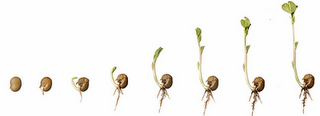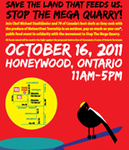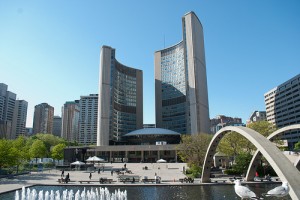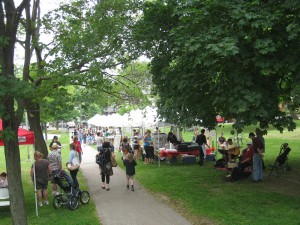Local Food
If this documentary video doesn’t make you want to ditch the city and get out into some more harvest-time-country-fair action, I don’t know what.
It’s all about the local food scene in Quebec’s Eastern Townships, a region very close to my heart, where I grew up. The film is made by two friends in Montreal. Nice work, ladies!
For full episode, go to The Townshipper’s Table on cbc.ca.
Here’s a YouTube preview:
Ontario schools introduced some sweeping food changes to their cafeterias in 2010. The School Food and Beverage Policy forbade the sale of foods with “few or no nutrients, and/ or contain high amounts of fat, sugar or sodium.” Sounds like a good thing, right? Healthier food for kids helps them grow, think more clearly and do better in school. I give the move a ringing endorsement all round. The thing is, the changes have resulted in driving some kids out of the cafeteria altogether — and into nearby convenience stores and fast-food chains, where their business is received with open arms.
But can you blame the kids? After all, wasn’t it always cooler to not eat at the caf?
Well, the Peel District School Board has made a move to change that. The secondary school students of the PDSB, which represents 150 000 students from K to 12, have just held their 2nd annual Cooking Up Action challenge, in which students compete to create enticing menu items using local and sustainable ingredients. The winning recipes will even be added to the lunch menus at PDSB cafeterias in September 2012. Not bad.
The challenge is part of the School Food Action Coalition project, facilitated by Eco Source, a local environmental organization, in partnership with Chartwells, the PDSB foodservice supplier, and Peel Public Health.
In all, 55 teams competed this year, using local ingredients and complying with Ontario’s School Food and Beverage Policy to earn extra points. There were three winning recipes: Sweet Potato & Pear Soup and Blueberry Muffins from Clarkson Secondary School, and Chicken Penne from John Fraser Secondary School.
To make sure flavour, appearance and the joy of eating weren’t lost in the mix, PDSB students themselves sat on the final judging panel, along with reps from Peel Public Heath and Chartwells.
The goal of the challenge, says Stephanie Crocker, Associate Director of Eco Source, was to engage the students with food and provide a hands-on learning experience about local food and healthy eating. And of course, give some options at the caf that might just give the corner store a run for its money.
Check out how the participants from last year did. I love these guys!
Cooking Up Action 2011 5:46 min.
Spring is here! And the Seedy Saturday (and Sunday) Seed Exchanges throughout Canada are going fast. (I have a new garden to play with this year, so I’m rather excited.)
I haven’t managed to make it to one of these exchanges, where you can buy heirloom and rare seeds for your garden (or balcony), BUT the next two exchanges in my area are entered in my phone. Really.
For dates in your area, see the Seeds of Diversity site.
If there isn’t a seed exchange near you, here are some worthy-of-your-$ seed suppliers that also do good work to preserve seed heritage:
Seeds of Diversity Resource List 2012
If you’re in Toronto, Urban Harvest sells directly at these farmers’ markets:
- Dufferin Grove Thursdays 3-7 year round
- Wychwood Barns Saturdays 8-1 year round
- Leslieville Sundays 9-2 until late October
If you have some old seed packages on hand, left over from previous years, but are wondering if they might be genetically modified, visit the Safe Seed Resource List for 2012, by the Council for Responsible Genetics. This lists seed companies that have signed the Safe Seed Pledge, promising to “not knowingly buy or sell genetically engineered seeds or plants.”[1]
If you can’t find the brand you have on hand, I will humbly submit that you refresh your seed stock with organic or heritage seeds. After all, if you’re going to take the time and energy to grown your own food, make it worth it!
A food activist friend sent me a little article from the Globe and Mail not long ago about how local food may not always be the most ethical choice.
I was intrigued. I tend to hold up local on a pedestal as an example of socially, economically and environmentally responsible sustainable farming. Silly me!
I picture friends who run family farms, use woofers and sell organics at outdoor markets, small stores and select restaurants. Again, silly me!
The article, Local food = ethical food? Doesn’t always work that way, by Wency Leung, challenges us to extend our consumer awareness to the condition and treatment of farm workers in our own backyard.
If you boycott companies because they use child labour or don’t allow pee breaks on the assembly line, why would you buy cucumbers from the guy who poisons his workers and pollutes the land right next to you?
Just because Farmer Brown is only down the road a ways does not mean that he is necessarily a great guy who treats his workers, animals and land well.
Yes, this is a tough one. I want to support farmers; they are the ones who feed us. But I think this is a reminder that we need to consider the ethical behavior of the farmer – our local farmer — when buying our food. As Leung ‘s article suggests, the simple fact that he’s close by may not mean he deserves our business.
This Sunday, October 16, is World Food Day. As decreed by the UN’s Food and Agriculture Organization, it is the official day to encourage agricultural food production and stimulate farming efforts, as well as several other food security issues.
If you’re looking to celebrate local bounty and defend your right to healthy, local food, this Sunday is your day.
And lucky you, if you’re in Southern Ontario, this weekend is Foodstock.
Even the Foodstock poster recalls that other ‘stock that changed so much, which took place back in 1969 in an upstate New York farmer’s field. Remember that? Neither do I. This time, the little birdy is perched on a saucepan handle. Nice.
The Foodstock deets
If you haven’t heard, Foodstock is a pay-what-you-can, outdoor, food and music event in Melancthon County. It is the baby of activist chef Michael Stadtländer, who has invited some 100 top chefs from across Canada to prepare locally produced treats just for you. And it gets better.
Foodstock is a fundraiser to support of the movement to Stop the Mega Quarry. All funds go to stop the mega quarry application by the Highland Companies to create a limestone quarry that would cover over 2300 acres of prime agricultural land and dig into pristine aquifers next to the Niagara Escarpment.
Sunday’s event is open to the public and is pay-what-you-can, though the suggested price is $10 – which is a steal if you consider the caliber of chefs who will be there — all the gros fromages from Toronto’s resto scene and beyond, including Jamie Kennedy, Pizzeria Libretto, Oyster Boy, Café Belong and Enoteca Sociale. Ethical suppliers such as Hooked, Cumbrae’s and Choco Sol have also offered support.
By bringing local food producers and consumers together, Foodstock aims to highlight the connection between eaters and farmers, and encourage those who love local food to stand up and voice their opposition to a project whose opponents fear will destroy the region’s farmland and way of life.
The Highland Companies is owned by a Boston-based hedge fund. According to the Toronto Star, the company assembled farmland north of Organgeville to grow potatoes, and then made their application to develop one the biggest rock quarries in Canada—1 million tonnes of limestone from fertile potato fields. We need limestone, yes. But do we need this limestone? It sets an odd precedence to value pavement over food.
When: Sunday Oct 16, 11 a.m. to 5 p.m.
Where: Outdoors, on the Honeywood-area farm of Diane and Bill French, who own remaining farmland that has not sold to the Highland Companies
Transportation: http://nomegaquarry.ca/events/foodstock/
Cost: PWYC, suggested price $10. Pay in advance or at the gate.
What to bring: dress for the outdoors and, if you can, bring your own plates and cutlery to cut down on waste
Despite the rain and chilly weather today, the fifth Picnic at the Brickworks was a feast of flavours that warmed the bellies of all who attended the open air space.
As a first-timer to this annual event, I didn’t know what to expect. I secretly feared foodie elitism might set the tone, but it couldn’t have been farther from the truth. It was a farm friendly, food lovin’ crowd who were happy to mix and enjoy some friendly conversation while sampling some of the tastiest dishes our region has to offer.
The food was fantastic. Seasonal harvests from throughout Southern Ontario’s culinary regions prepared by local chefs committed to sourcing their food from small scale, sustainable, local farms and suppliers.
It would be impossible for every delicious item from every table to be the ultimate winner, but I had the pleasure of enjoying a truly sublime locally sourced squab and bacon cassoulet with pistachio crumble from Auberge du Pommier, and from Canoe, Cumbrae Farms beef tartare with a pine jelly that took it up just the right notch.
Thank you to Evergreen and Slow Food Toronto for making high-end fare a little more user friendly.
The entire Toronto Urban Agriculture Program is under attack.
Last week, consultants, hired by the Mayor as part of the City Services Review, reported their findings in determining which services need to be reduced or cut entirely.
What they found was that 90% of services are in fact core or essential. Unable to find savings, the consultants are recommending cuts to recycling and environmental programs — including the Urban Agriculture program, which allows residents and community groups to grow healthy, fresh and affordable food on excess City parkland.
When did investments in our future become costs?
Hundreds of people went to City Hall last week to ask the committees to reject service cuts. But councilors have refused to take anything off the chopping block.
So now we have to wait for September, when the Mayor and his Executive Committee will decide if recycling programs, urban forestry goals and urban agriculture programs are ‘gravy’, or the building blocks of a progressive, sustainable, world-class city that this town wants to become.
Hoo … ray!
City Council has voted nearly unanimously to keep Toronto’s local food procurement policy. This means city child care centres and long-term care homes can continue to provide locally sourced food in the meals they serve.
“This is a win for the City’s food movement, the environment and Toronto food sector jobs,” said Darcy Higgins, Executive Director of Food Forward. “In deciding to support local food, Council sends a clear message that it cares about local farms and healthier food for its residents.”
This is a victory for Ontario on economic, environmental and nutritional levels, and goes to show that emails, letters and petitions from the public can make a difference.
We’re pretty disappointed that members of the municipal government in our hometown, Toronto, are pushing to step away from their buy local food policy. It seems very shortsighted to curtail a policy that is good for the health of our citizens, good for the planet, and helps local food producers – simply to “get the biggest bang for our buck”.
If you’d like to send a message to City Hall on this issue, the good folks at Toronto Environmental Alliance have put a petition online you can sign by clicking here.
Get the real deal with certified local farmers’ markets.
Have you been to a MyMarket? After being told by those who know I that I had to check out a MyMarket, I took advantage of some free time today and cycled over to East Lynn Park’s Thursday afternoon market — a small but growing neighbourhood farmers’ market just a stone’s throw from Woodbine and the Danforth.
Like the other MyMarkets around Toronto, East Lynn is certified MyPick™, which means the farms have been verified as authentically local, and the items the farmer is selling truly come from his or her farm. I.E. you are buying direct. No middleman. No food depot. No farmy re-packaging of someone else’s produce. It’s what a farmers’ market should be.
Diana Gonzalez, Toronto District Supervisor for MyMarket, explained to me that MyMarket inspectors go so far as to check the farmers’ seed invoices, as well as crops in the ground or livestock being raised, to ensure everything is on the up and up. And on every market day, market managers check that the items each farmer is selling match up with activities back at the farm.
All very impressive, right? That’s a lot of legwork and effort and time to make sure that the dollars you devote to supporting local food truly support local food.
It’s great. It’s crazy. It’s wonderful. I’m dizzy. So why aren’t we all shopping there?
Chatting with some of the farmers, I learned that shopper turn out can sometimes be quite poor – something they couldn’t understand because of “all houses all around us!” East Lynn is a relatively new market. If the neighbourhood wants to have continued access to fresh strawberries, sweet peas, wildflower honey, maple syrup and lamb chops, not to mention all the other baked treats I saw, it’s time to step up and show your support!
If we don’t support the local markets, our local farmers won’t bother coming in to see us, and we’ll be forced to shop for depot food at the supermarket.
C’mon out folks. It was a late spring, but it’s all coming up roses now!





